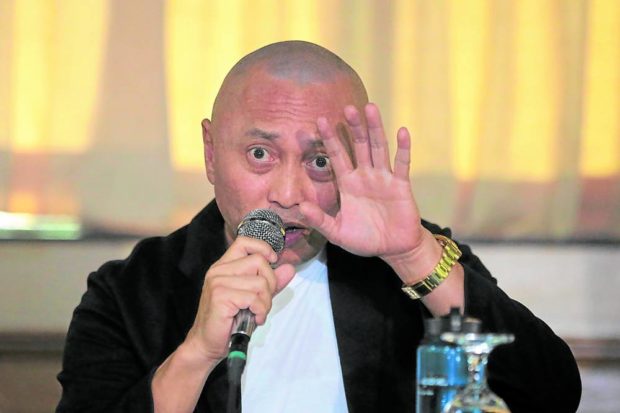
Negros Oriental Rep. Arnolfo Teves Jr. (File photo by GRIG C. MONTEGRANDE / Philippine Daily Inquirer)
MANILA, Philippines — Suspended Negros Oriental 3rd District Rep. Arnolfo Teves Jr. has called out the House of Representatives leadership and the Committee on Ethics and Privileges again for not allowing him to participate via videoconferencing, insisting that his absences were forced.
In an online briefing on Tuesday night, Teves asked COOP-NATCCO party-list Rep. Felimon Espares, the committee chair, why he was obsessed with him returning to the Philippines.
Espares — who spearheaded a committee hearing earlier into Teves’ continuous absence from the House — appealed to the lawmaker, who is accused of the murder of Negros Oriental Gov. Roel Degamo, to return home
That way, Espares said, his committee would no longer deliberate on further action once Teves’ suspension lapses on July 31.
“My continued absence, he says, might force the committee to recommend for my expulsion,” Teves said partly in Filipino.
“Here’s what I can say to you, Espares: Why do you keep chasing me? And don’t use the name of the committee. That committee only became unanimous [in its decisions] because the others felt compelled, you know. There are others there who stood up for me, but they just got backed into a corner.”
“Also, why was I deemed absent when I was present in Zoom? ‘That’s the question, a legal question. I don’t know what my lawyer thinks about it — about which court this would go to, if any But again, I was told that I was deemed absent. So when you say my continued absence, it’s a forced absence,” he added.
Teves further maintained that it is only Espares and House Speaker Ferdinand Martin Romualdez who wanted him to return to work physically.
“The only people who want me to return home and force me to comply physically are Martin Romualdez and Espares. Hey, Espares, don’t be like that. You should have done that when you were facing me. Now you’re doing it just because I’m far away. Now you’re pinning me down.” Teves said.
“They forced me to be absent even if I was present. Why am I not allowed to participate through Zoom when others can? Romualdez said: ‘Face the music.’ But what music should I face? Where? What tribunal should a face? I don’t have an arrest order. There’s no case against me.”
The House allowed Teves to travel to the United States for medical reasons. The travel authorization was valid from Feb. 28 to March 9, 2023. However, Teves did not return home after he was accused by authorities of masterminding the killing of Negros Oriental governor Roel Degamo, who was attacked inside his residence last March 4.
Teves maintained that he and his brother, former Gov. Pryde Henry Teves, had nothing to do with the attack, as they would not benefit from it. However, the lawmaker refused to return to the Philippines, citing concerns for his and his family’s safety.
Romualdez urged the lawmaker to return, assuring him that his safety would be guaranteed. However, as he failed to return home, Espares’ committee recommended a 60-day suspension as a sanction.
It was adopted by the House last March 22. After the suspension period lapsed on May 22, the Committee on Ethics and Privileges recommended another 60-day suspension as Teves still refused to return.
During the deliberation of the new 60-day suspension at the plenary, Rizal 1st District Rep. Michael John Duavit, who is Teves’ party-mate, urged the lawmaker to return and reflect on the gravity of his decision to seek political asylum with Timor Leste.
He also urged Teves to look at the call of the House for him to return home as a lifeline — not as an attack on him.
But Teves’ counsel, lawyer Ferdinand Topacio, maintained that the lawmaker could not be considered absent or evasive of legal proceedings as he had been representing his client.
“When they say that we are evasive of the proceedings, that is wrong. They should read Article 3 of our Constitution. What is stated there when it comes to the rights of a person under investigation for a crime? It’s very clear there that ‘any person under investigation for the commission of a crime has the right to be heard by himself or counsel.’ That means when a lawyer appears in the proceedings, at the DOH, et cetera, it is as if you were already there,” Topacio said.